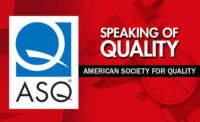
Howard Harary (right), acting director of NIST’s Manufacturing Engineering Laboratory, accepts the Automotive Industry Action Group’s Chairman’s Award from AIAG Chair Brian Vautaw. Source: The National Institute of Standards and Technology
NIST’s contributions to AIAG have been in engineering and product development, electronic commerce and supply chain management. NIST’s Manufacturing Engineering Laboratory contributed to several standards efforts, including the International Organization for Standardization’s (ISO) standard for the exchange of product model data, product data management interoperability, dimensional mark-up language standardization, quality measurement data specification development, inventory visibility and interoperability guidelines and intercontinental supply chain management.
Researcher Peter Denno of NIST’s Manufacturing Engineering Laboratory also was recognized for his contribution to AIAG with a 2009 Outstanding Achievement Award for his leadership and contributions on the Materials Off-Shore Sourcing (MOSS) data standardization and process management supply chain management project.
Denno led the development of information exchange standards for the MOSS project to improve the efficiency of operating long-distance supply chains of ocean-going automotive parts into U.S. assembly plants. Supply chain logistics account for about 10% of the cost of the average car-the same amount as labor. Denno also received the Outstanding Achievement Award in 2008.
AIAG is a not-for-profit organization of automotive sector original equipment manufacturers, suppliers, service providers, and government and academia representatives. These groups have worked collaboratively to drive cost and complexity from the supply chain via global standards development and harmonized business practices.


